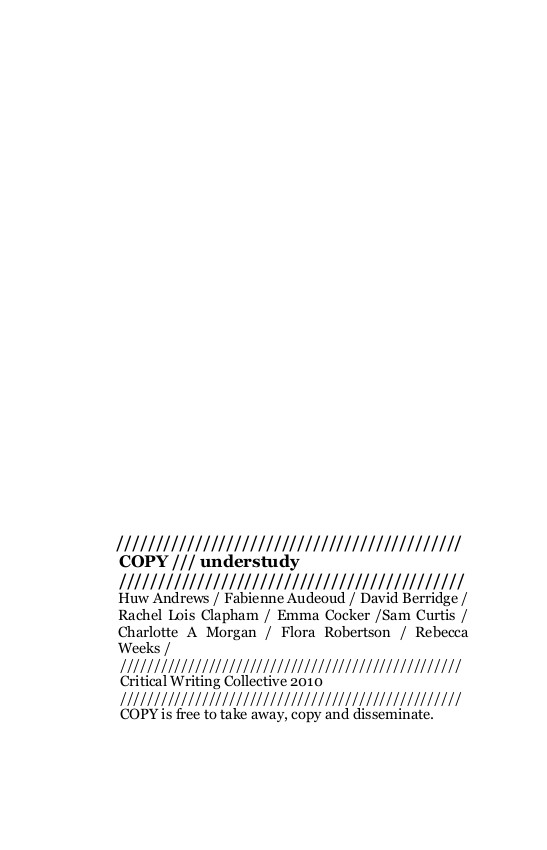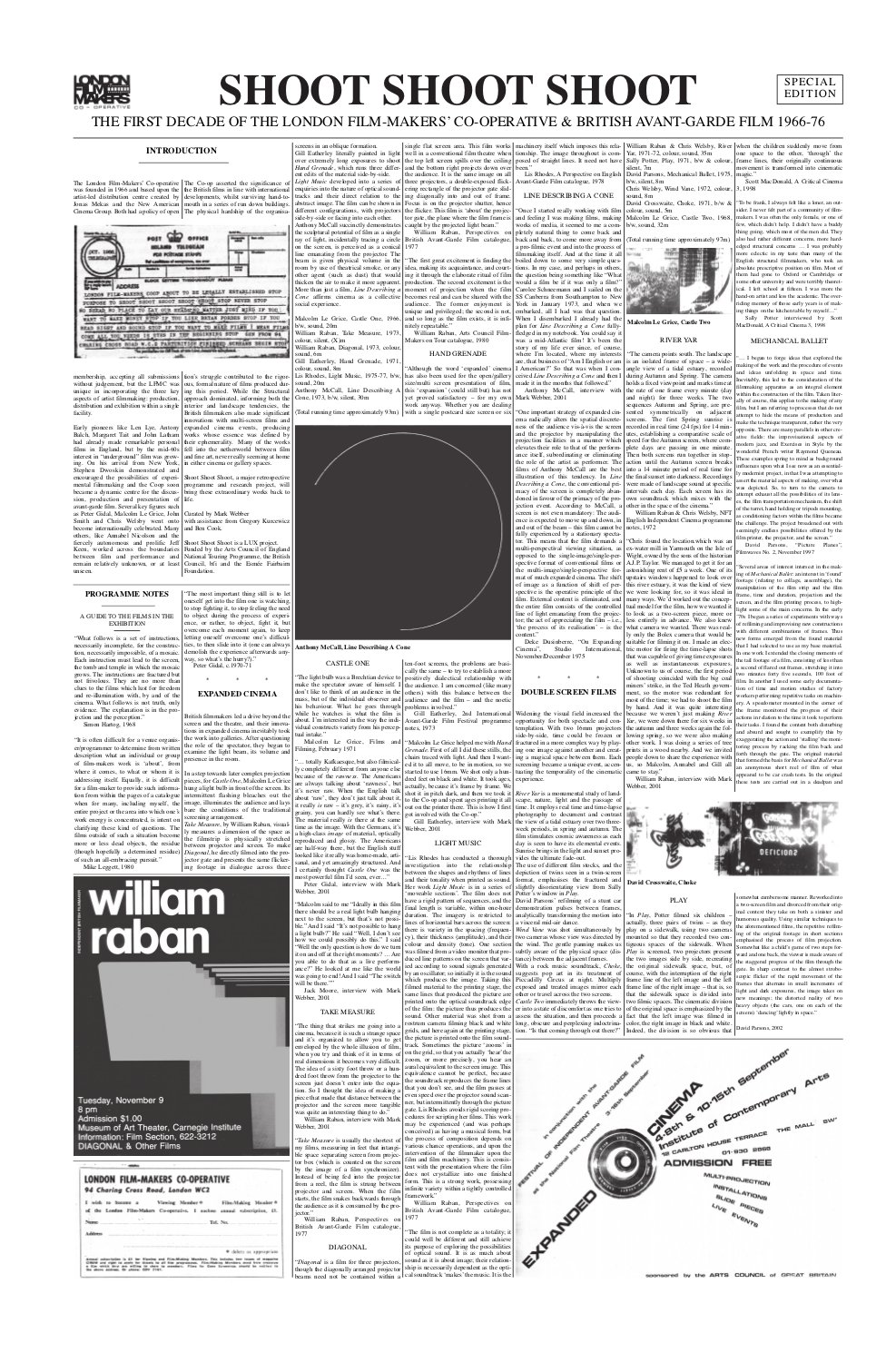COPY, 1: Understudy (2010)
Filed under magazine | Tags: · art, art criticism, contemporary art, performance, united kingdom

“COPY is a publication of critical/experimental writing as or in the field of visual art and performance.
This issue of COPY is launched as part of The Plaza Principle, curated by Derek Horton and Chris Bloor in the partially vacant 1980s Leeds Shopping Plaza; an exhibition that aims to acknowledge the economic context in which artists are invited to occupy vacant shop units to disguise or compensate for economic decline in the nations town, city and district centres, supplementing commercial inactivity with cultural activity.
COPY proposes understudy as a point from which to consider, reflects and interrupt this context through a collection of art writing around the stand in – the temporary, illusory, consumed or performed; smoke and mirrors; the assessed, inquired or theorized. The works in this issue address, allude to or form tangents from these ideas and present a range of approaches to the use of the page, print and the form and nature of writing as or within practice.”
Contributors include Huw Andrews, Fabienne Audeoud, David Berridge, Rachel Lois Clapham, Emma Cocker, Sam Curtis, Charlotte A Morgan, Flora Robertson and Rebecca Weeks.
Developed by Critical Writing Collective, a network and platform for art writing and critical dialogue based in the Yorkshire region, UK.
Free to take away, copy and disseminate
26 pages
PDF (added on 2017-12-2)
Scribd
Shoot Shoot Shoot: The First Decade of the London Film-Makers’ Co-operative and British Avant-Garde Film 1966-1976 (2002)
Filed under brochure | Tags: · 1960s, 1970s, expanded cinema, experimental film, film, film history, united kingdom
Broadsheet for the film exhibition curated by Mark Webber and organised by LUX London. Includes film descriptions, chronology of events and developments 1966-76, and the article by A.L. Rees.
“The London Film-Makers’ Co-operative was founded in 1966 and based upon the artist-led distribution centre created by Jonas Mekas and the New American Cinema Group. Both had a policy of open membership, accepting all submissions without judgement, but the LFMC was unique in incorporating the three key aspects of artist filmmaking: production, distribution and exhibition within a single facility.
Early pioneers like Len Lye, Antony Balch, Margaret Tait and John Latham had already made remarkable personal films in England, but by the mid-60s interest in “underground” film was growing. On his arrival from New York, Stephen Dwoskin demonstrated and encouraged the possibilities of experimental filmmaking and the Coop soon became a dynamic centre for the discussion, production and presentation of avant-garde film. Several key figures such as Peter Gidal, Malcolm Le Grice, John Smith and Chris Welsby went onto become internationally celebrated. Many others, like Annabel Nicolson and the fiercely autonomous and prolific Jeff Keen, worked across the boundaries between film and performance and remain relatively unknown, or at least unseen.
The Co-op asserted the significance of the British films in line with international developments, whilst surviving hand-to-mouth in a series of run down buildings. The physical hardship of the organisation’s struggle contributed to the rigorous, formal nature of films produced during this period. While the Structural approach dominated, informing both the interior and landscape tendencies, the British filmmakers also made significant innovations with multi-screen films and expanded cinema events, producing works whose essence was defined by their ephemerality. Many of the works fell into the netherworld between film and fine art, never really seeming at home in either cinema or gallery spaces.
Shoot Shoot Shoot, a major retrospective programme and research project, will bring these extraordinary works back to life.
Curated by Mark Webber with assistance from Gregory Kurcewicz and Ben Cook.
Shoot Shoot Shoot is a LUX project.” (from Introduction)
Publisher Lux, London, May 2002
8 pages
project
more (touring programme, Lux Online)
overview of the touring programme (George Clark, Senses of Cinema)
DVD anthology (published in 2006)
PDF (85 MB, added on 2014-12-22), Scribd
Comment (0)Michael T. Saler: The Avant-Garde in Interwar England: Medieval Modernism and the London Underground (1999)
Filed under book | Tags: · 1920s, 1930s, 1940s, art, art criticism, art history, avant-garde, united kingdom

This book addresses modernism’s ties to tradition, commerce, nationalism, and spirituality through an analysis of the assimilation of visual modernism in England between 1910 and 1939. Specifically, The Avant-Garde in Interwar England explores the life of Frank Pick, managing director of the London Underground, whose patronage of modern artists, architects, and designers was guided by a desire to unite nineteenth-century arts and crafts with twentieth-century industry and mass culture. Saler demonstrates that modernism was widely associated in England with medievalism, and was also thought to have direct social, economic, and spiritual benefits for the nation.
Publisher Oxford University Press, 1999
ISBN 0195119665, 9780195119664
242 pages
PDF (updated on 2012-7-18)
Comment (0)

